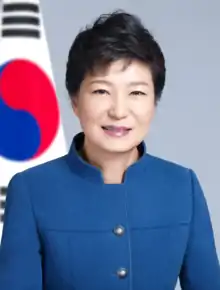2012 South Korean presidential election
Presidential elections were held in South Korea on 19 December 2012. They were the sixth presidential elections since democratization and the establishment of the Sixth Republic, and were held under a first-past-the-post system, in which there was a single round of voting and the candidate receiving the highest number of votes was elected. Under the South Korean constitution, a president is restricted to a single five-year term in office. The term of the then incumbent president Lee Myung-bak ended on 24 February 2013. According to the Korea Times, 30.7 million people voted with turnout at 75.8%. Park Geun-hye of the Saenuri party was elected the first female South Korean president with 51.6% of the vote opposed to 48.0% for her opponent Moon Jae-in.[1] Park's share of the vote was the highest won by any candidate since the beginning of free and fair direct elections in 1987.[2]
| |||||||||||||||||
| Turnout | 75.84% | ||||||||||||||||
|---|---|---|---|---|---|---|---|---|---|---|---|---|---|---|---|---|---|
| |||||||||||||||||
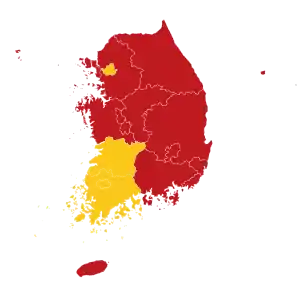 Results by province and city ■ – Park Geun-hye ■ – Moon Jae-in | |||||||||||||||||
| |||||||||||||||||
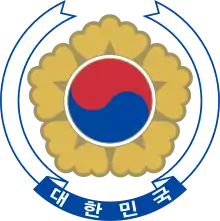 |
|---|
| This article is part of a series on the politics and government of the Republic of Korea |
|
|
In 2017, following Park's impeachment and removal from office, Moon would go on to succeed her as the 12th President of South Korea following a second, successful bid for the presidency.
Background
Lee Myung-bak was elected President of South Korea in 2007 as the nominee of the conservative Grand National Party after a closely contested primary in which he narrowly defeated Park Geun-hye, and assumed office in February 2008.[3] His victory brought to a close ten years of liberal administration under Kim Dae-jung and Roh Moo-hyun. The Lee Myung-bak government pursued the reduction of government bureaucracy and a laissez-faire economic policy,[4] and came under criticism from the left for political scandals and controversial policies such as the Jeju-do Naval Base and its support of the South Korea-United States Free Trade Agreement, although both were initiated under the previous administration.[5][6] Despite the fact that he was elected in a landslide victory and received initial approval ratings of 70%,[7] Lee's ratings had declined to below 30% by 2012.[8]
At the end of 2011, Park Geun-hye assumed control of the Grand National Party, which was subsequently renamed the Saenuri or New Frontier Party in February 2012.[9] She distanced herself from Lee and led the party towards the center.[10][11] In legislative elections in April 2012, Park guided the party to an upset victory, returning its majority in the National Assembly.[12] This contributed to an increase in her poll ratings and consolidated her position as frontrunner for the Saenuri nomination.[13]
Opposition to Saenuri is divided primarily between the Democratic United Party and independent supporters of Ahn Cheol-soo, who has emerged as a leading potential candidate despite his ostensible silence on the race.[14] In the DUP, focus initially lay on Sohn Hak-kyu as a potential nominee, but by late 2011 Moon Jae-in, a confidant of former president Roh, had overtaken Sohn in polls.[15] Although the DUP invited Ahn to join the party,[16] only 2.3% of respondents to a poll on 21 April thought that Ahn was best suited to be DUP nominee.[17] The DUP itself has been troubled by the split between pro-Roh members such as Moon Jae-in and the "Honam wing" of former president Kim Dae-jung, represented by Chung Dong-young.[18]
Registered candidates
Ballot numbers for party candidates were given according to the candidate's party seat distribution in the National Assembly. Ballot numbers for independent candidates were determined through a random lottery by the National Election Commission.
| 1 | 2 | 3 (Resigned) | 4 | 5 | 6 | 7 |
| Park Geun-hye |
Moon Jae-in |
Lee Jung-hee |
Park Jong-sun |
Kim So-yeon |
Kang Ji-won |
Kim Soon-ja |
| Saenuri | Democratic United | Unified Progressive | Independent | Independent | Independent | Independent |
Nominations
Nominee
|
| |||||||||||||||||||||||||||||
| Moon Jae-in | |||||||||||||||||||||||||||||
|---|---|---|---|---|---|---|---|---|---|---|---|---|---|---|---|---|---|---|---|---|---|---|---|---|---|---|---|---|---|
 | |||||||||||||||||||||||||||||
| Member of the
National Assembly | |||||||||||||||||||||||||||||
Campaign
The 2012 Democratic United Party presidential primary saw an open primary system implemented for the first time. This new open primary introduced "mobile voting"; it was hailed as a "revolution in voting" because people could participate in voting more conveniently. However, controversies persisted during the primary elections, as questions of the legitimacy and trustworthiness of the voting results were raised.[19] The official result was announced on 16 September 2012, at 15:32 KST, naming Moon Jae-in the presidential candidate from the Democratic United Party.[20] After winning the nomination, Moon stated that he would like to join forces with Ahn Cheol-soo.[21]
Candidates
- Moon Jae-in, Member of National Assembly from Busan
- Sohn Hak-kyu, former Governor of Gyeonggi
- Kim Doo-kwan, former Governor of South Gyeongsang
- Chung Sye-kyun, Member of National Assembly from Seoul
- Park Joon-young, Governor of South Jeolla
- Jo Gyeong-tae, Member of National Assembly from Busan
- Kim Jung-kil, former Minister of the Interior
- Kim Yong-hwan, former Member of National Assembly from Gyeonggi
Jo, Kim J and Kim Y were disqualified by the party through a cutoff poll, where only top five candidates were allowed to pass to primaries.[22] Park withdrew before the primaries began.
Results
P= Pre-registered electors who voted at Polling booths; M: Pre-registered electors who voted through Mobile devices; D= Party Delegates who voted at the polling booths
Moon Jae-in won the nomination on the first ballot, so no run-off contest was needed.[23]
| Dates | Races | Moon | Sohn | Kim | Chung | Total | ||||||
|---|---|---|---|---|---|---|---|---|---|---|---|---|
| Votes | % | Votes | % | Votes | % | Votes | % | Votes | % | |||
| 25 Aug. | Jeju | P | 301 | 49.5 | 155 | 25.5 | 134 | 22.0 | 18 | 3.0 | 608 | 100 |
| M | 11,701 | 60.5 | 3,693 | 20.5 | 2,739 | 14.2 | 942 | 4.9 | 19,35 | 100 | ||
| D | 21 | 14.1 | 52 | 34.9 | 71 | 47.7 | 5 | 3.4 | 149 | 100 | ||
| 26 Aug. | Ulsan | P | 176 | 58.5 | 42 | 14.0 | 50 | 16.6 | 33 | 11.0 | 301 | 100 |
| M | 4,719 | 51.9 | 1,058 | 11.6 | 2,974 | 32.7 | 347 | 3.8 | 9,098 | 100 | ||
| D | 56 | 51.4 | 17 | 15.6 | 29 | 26.6 | 7 | 6.4 | 109 | 100 | ||
| 28 Aug. | Gangwon | P | 192 | 50.0 | 121 | 31.5 | 52 | 13.5 | 19 | 4.9 | 384 | 100 |
| M | 2,598 | 46.9 | 2,075 | 37.4 | 574 | 10.4 | 298 | 5.4 | 5,545 | 100 | ||
| D | 47 | 18.2 | 132 | 51.2 | 52 | 20.2 | 27 | 10.5 | 258 | 100 | ||
| 30 Aug. | North Chungcheong | P | 209 | 39.5 | 232 | 43.9 | 80 | 15.1 | 8 | 1.5 | 529 | 100 |
| M | 7,796 | 46.4 | 6,755 | 40.2 | 1,780 | 10.6 | 455 | 2.7 | 16,786 | 100 | ||
| D | 127 | 39.4 | 121 | 37.6 | 71 | 22.0 | 3 | 0.9 | 322 | 100 | ||
| 1 Sep. | North Jeolla | P | 782 | 17.1 | 1,259 | 27.5 | 684 | 14.9 | 1,855 | 40.5 | 4,580 | 100 |
| M | 15,489 | 40.3 | 8,757 | 22.8 | 4,707 | 12.3 | 9,443 | 24.6 | 38,396 | 100 | ||
| D | 79 | 13.7 | 177 | 30.7 | 63 | 10.9 | 258 | 44.7 | 577 | 100 | ||
| 2 Sep. | Incheon | P | 191 | 42.9 | 153 | 34.4 | 73 | 16.4 | 28 | 6.3 | 445 | 100 |
| M | 5,607 | 51.2 | 2,841 | 25.9 | 1,823 | 16.6 | 687 | 6.3 | 10,958 | 100 | ||
| D | 130 | 30.2 | 149 | 34.6 | 80 | 18.6 | 72 | 16.7 | 431 | 100 | ||
| 4 Sep. | South Gyeongsang | P | 354 | 25.1 | 136 | 9.6 | 908 | 64.3 | 14 | 1.0 | 1,412 | 100 |
| M | 11,216 | 46.5 | 2,256 | 9.4 | 10,265 | 42.6 | 374 | 1.6 | 24,111 | 100 | ||
| D | 113 | 29.4 | 52 | 13.5 | 208 | 54.0 | 12 | 3.1 | 385 | 100 | ||
| 6 Sep. | Gwangju, South Jeolla | P | 1,385 | 27.6 | 2,182 | 43.4 | 1,257 | 25.0 | 200 | 4.0 | 5,024 | 100 |
| M | 32,345 | 50.5 | 20,053 | 31.3 | 9,546 | 14.9 | 2,105 | 3.3 | 64,049 | 100 | ||
| D | 179 | 19.9 | 375 | 41.7 | 215 | 23.9 | 130 | 14.5 | 899 | 100 | ||
| 8 Sep. | Busan | P | 714 | 64.1 | 90 | 8.1 | 290 | 26.0 | 20 | 1.8 | 1,114 | 100 |
| M | 17,162 | 66.4 | 2,577 | 10.0 | 5,542 | 21.4 | 562 | 2.2 | 25,843 | 100 | ||
| D | 259 | 62.6 | 59 | 14.3 | 75 | 18.1 | 21 | 5.1 | 414 | 100 | ||
| 9 Sep. | Daejeon | P | 468 | 57.1 | 215 | 26.3 | 95 | 11.6 | 41 | 5.0 | 819 | 100 |
| M | 14,373 | 63.3 | 4,026 | 17.7 | 2,481 | 10.9 | 1,838 | 8.1 | 22,718 | 100 | ||
| D | 263 | 48.1 | 139 | 25.4 | 64 | 11.7 | 81 | 14.8 | 547 | 100 | ||
| 12 Sep. | Daegu | P | 365 | 57.4 | 90 | 14.2 | 169 | 26.6 | 12 | 1.9 | 636 | 100 |
| M | 9,745 | 57.5 | 3,028 | 17.9 | 3,318 | 19.6 | 846 | 5.0 | 16,937 | 100 | ||
| D | 165 | 34.7 | 96 | 20.2 | 134 | 28.2 | 80 | 16.8 | 475 | 100 | ||
| 15 Sep. | Gyeonggi | P | 1,219 | 55.7 | 677 | 30.9 | 187 | 8.5 | 107 | 4.9 | 2,190 | 100 |
| M | 47,844 | 63.5 | 17,270 | 22.9 | 6,661 | 8.8 | 3,527 | 4.7 | 75,302 | 100 | ||
| D | 522 | 37.0 | 530 | 37.5 | 130 | 9.2 | 230 | 16.3 | 1,412 | 100 | ||
| 16 Sep. | Seoul | P | 1,434 | 56.3 | 688 | 27.0 | 229 | 9.0 | 195 | 7.7 | 2,546 | 100 |
| M | 156,122 | 60.8 | 53,197 | 20.7 | 29,845 | 11.6 | 17,756 | 6.9 | 256,920 | 100 | ||
| D | 715 | 42.5 | 41 | 24.4 | 187 | 11.1 | 371 | 22.0 | 1,683 | 100 | ||
| Total | 347,183 | 56.5 | 136,205 | 22.2 | 87,842 | 14.3 | 43027 | 7.0 | 614,257 | 100 | ||
Nominee
|
| |||||||||||||||||||||||||||||
| Park Geun-hye | |||||||||||||||||||||||||||||
|---|---|---|---|---|---|---|---|---|---|---|---|---|---|---|---|---|---|---|---|---|---|---|---|---|---|---|---|---|---|
_(cropped).jpg.webp) | |||||||||||||||||||||||||||||
| Leader of the Saenuri Party (2011–2012) | |||||||||||||||||||||||||||||
Campaign
The first member of the Saenuri Party to officially announce their candidacy was Kim Moon-soo on 22 April. Kim, a former labor activist, stated in his announcement that he would focus on combating regional and socioeconomic divides, emphasized his commitment to a policy of multiculturalism, and argued for a revision in Saenuri's primary system. He stated further that Park Geun-hye's leadership of the party represented only an "ambiguously prevailing trend", and could not be relied upon to reach victory in the elections.[14] Although Kim said that he was "convinced" he could "attract more support than [Park]", he was not widely expected to garner a high level of support. His early announcement was regarded as an attempt to preemptively form an anti-Park faction in the party.[24]
Chung Mong-joon, a billionaire and longstanding member of the National Assembly, followed on 29 April. In his announcement, Chung emphasized the need to confront regionalism and factional politics, and stated that he would "write a new history of the Republic of Korea by facilitating [his] experience of managing a business, engaging in diplomacy and creating unity in the nation". He stressed that his task was to "bring together the divided hearts of the people" and that he was concerned that the "country could collapse in its current situation".[25] Like Kim Moon-soo, Chung is expected to be at a disadvantage to Park.[25] Chung previously declared his candidacy in the 2002 presidential elections but later dropped out to endorse Roh Moo-hyun.[26]
The former Mayor of Incheon, Ahn Sang-soo, declared his candidacy on 6 May, emphasizing his economic credentials and stating that he would relieve the burden of debt.[27] Former presidential Chief of Staff Yim Tae-hee followed on 8 May, issuing a call for Park Geun-hye to act as a "kingmaker" that was interpreted as a request for her to step aside.[28] Yim, a moderate, proposed to join hands with independent Ahn Cheol-soo and DUP frontrunner Moon Jae-in in a bid to "demolish outdated politics".[29] On 10 May, five-term lawmaker and former Minister for Government Legislation and Special Affairs Lee Jae-oh announced his bid, promising to reform the constitution and cut his term as president to three years.[30]
The campaign for the Saenuri primaries has been characterized by a dispute between Park Geun-hye, as frontrunner and party leader, and her opponents in the party. She was cited in 2009 as the most influential politician in South Korea,[31] and has outranked other candidates in many polls throughout 2012,[32] though as of early May 2012 she is yet to officially declare her candidacy.[27] Park's opponents have called for Saenuri to adopt an open primary system rather than the present system based on an electoral college and opinion poll results.[33] At the end of April the Democratic United Party suggested a joint discussion on the issue of fully open primaries.[34] Park has been criticized for her taciturn and authoritarian style in leading the party, and Kim Moon-soo described her as overly "secretive".[33] Chung Mong-joon stated that under Park's leadership, "democracy in the party [had] gone missing".[35] Park strengthened her position when her ally Lee Hahn-koo was elected Saenuri's floor leader on 9 May.[36]
During a primary debate on 7 August 2012, primary candidate Kim Tae-ho asked if Park Geun-hye would agree that the May 16 coup by her father (Park Chung Hee) was both a coup and a "necessary decision", regarding Park's previous stance that the overthrow was a "revolution to save the country". Park confirmed her stance by answering, "I don’t think it’s the place of politicians to be fighting over whether [the 16 May incident] were a 'coup d’etat' or a 'revolution'”. She furthermore commented that "no one can refute that the events themselves did happen, whether you call them a 'coup' or a 'revolution.'” and that "we need to leave that issue" for history to decide.[37] In addition, during another debate on 8 August 2012, the moderator asked Park the minimum hourly rate for a part-time worker as of 2012. Park replied "I think it’s over 5,000 won, isn’t it?,” when the legal minimum wage was 4,580 won. In response, The South Korean Confederation of Trade Unions responded with a statement in which it said, "It is terribly discouraging when a person who wants to become president does not even know the country’s minimum wage, which is a minimal right for survival and the first step toward a welfare state".[38]
Candidates
- Park Geun-hye, Member of National Assembly as Proportional Representative
- Kim Moon-soo, Governor of Gyeonggi
- Kim Tae-ho, Member of National Assembly from South Gyeongsang
- Yim Tae-hee, former Member of National Assembly from Gyeonggi
- Ahn Sang-soo, former Governor of Incheon
- Chung Mong-joon, Member of National Assembly from Seoul
- Lee Jae-oh, former Minister for Special Affairs
Chung and Lee, in protest of the controversial primary rule negotiations, withdrew their bids for nomination before the convention.
Results
The official result was announced at Saenuri Convention, which took place on 20 August 2012 at 05:40 KST, nominating Park Geun-hye as the presidential candidate for the Saenuri Party.[39]
| Candidate | Place | Votes | Percentage |
| Park Geun-hye | Nominated | 86,589 | 83.97% |
| Kim Moon-soo | 2nd | 8,955 | 8.68% |
| Kim Tae-ho | 3rd | 3,298 | 3.20% |
| Yim Tae-hee | 4th | 2,676 | 2.69% |
| Ahn Sang-soo | 5th | 1,600 | 1.55% |
| 103,118 | 100.0% | ||
Registered
Park Jong-sun (Independent)
A former entrepreneur
Kim So-yeon (Independent)[40]
Elected to the Korean Confederation of Trade Unions
Kang Ji-won (Independent)[41]
Chairman of Korea Manifesto Center
Kim Soon-ja (Independent)[42]
A Cleaning worker, and former proportional representation candidate of New Progressive Party for 2012 South Korean legislative election
Withdrawn
 Ahn Cheol-soo[43][44]
Ahn Cheol-soo[43][44]
Former Dean of Seoul National University Graduate School of Convergence Science and Technology
Former Chairman of software firm AhnLab Inc
Lee Jung-hee (UPP)
former leader of UPP and former assemblywoman[45]
Lee Gun-gae[46]
A former National Assembly Member
Opinion polling
| Poll source | Date | Sample size | Margin | ||
|---|---|---|---|---|---|
| Park (%) Saenuri |
Moon (%) DUP | ||||
| JoongAng Ilbo[47] | 19–21 July 2012 | 2,000 | 56.6 | 35.0 | 21.6 |
| OhMyNews/Research View[48] | 16–17 July 2012 | 1,000 | 50.8 | 41.0 | 9.8 |
| Realmeter[49] | 29 May – 1 June 2012 | 3,000 | 52.5 | 38.6 | 13.9 |
| Hankyoreh /Korea Society Opinion Institute[50] | 26–27 May 2012 | 61.0 | 33.5 | 27.5 | |
| Realmeter[51] | 21–25 May 2012 | 3,750 | 52.6 | 37.9 | 14.7 |
| JoongAng Ilbo[52] | 15 May 2012 | 910 | 57.6 | 33.3 | 24.3 |
| Realmeter[53] | 14–18 May 2012 | 3,750 | 52.0 | 37.5 | 14.5 |
| Realmeter[54] | 7–11 May 2012 | 3,750 | 51.9 | 38.2 | 13.7 |
| Realmeter[55] | 7–8 May 2012 | 1,500 | 55.7 | 36.3 | 19.4 |
| Realmeter[56] | 30 April – 4 May 2012 | 3,000 | 52.4 | 38.0 | 14.4 |
| Realmeter[57] | 23–27 April 2012 | 3,750 | 50.9 | 40.3 | 10.6 |
| Realmeter[58] | 6–10 February 2012 | 3,750 | 44.3 | 43.0 | 1.3 |
| Realmeter[59] | 30 January – 3 February 2012 | 3,750 | 44.4 | 44.9 | 0.5 |
| Donga Ilbo[59] | 24 January 2012 | 46.7 | 38.4 | 8.3 |
Exit poll
KBS, MBC, and SBS Terrestrial Broadcasting Exit Survey
| Candidate | Estimated Percentage |
| Park Geun-hye | 50.1% |
| Moon Jae-in | 48.9% |
Election results
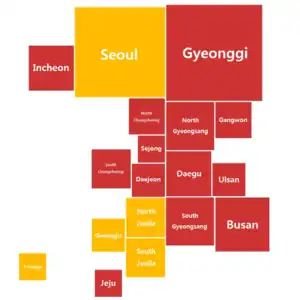
■ – Park Geun-hye
■ – Moon Jae-in
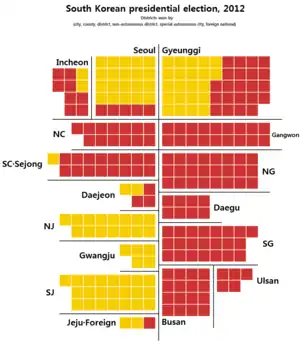
■ – Park Geun-hye
■ – Moon Jae-in
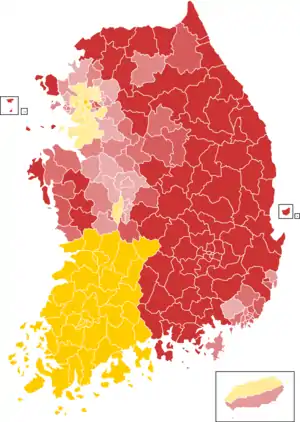
■ – Park Geun-hye
■ – Moon Jae-in
| Candidate | Party | Votes | % | ||
|---|---|---|---|---|---|
| Park Geun-hye | Saenuri Party | 15,773,128 | 51.55 | ||
| Moon Jae-in | Democratic United Party | 14,692,632 | 48.02 | ||
| Kang Ji-won | Independent | 53,303 | 0.17 | ||
| Kim Soon-ja | Independent | 46,017 | 0.15 | ||
| Kim So-yeon | Independent | 16,687 | 0.05 | ||
| Park Jong-sun | Independent | 12,854 | 0.04 | ||
| Invalid/blank votes | 126,838 | – | |||
| Total | 30,721,459 | 100 | |||
| Registered voters/turnout | 40,507,842 | 75.84 | |||
| Source: National Election Commission | |||||
| regions · provinces · cities | _(cropped).jpg.webp) |
||||
|---|---|---|---|---|---|
| Park Geun-hye Saenuri |
Moon Jae-in DUP | ||||
| Votes | % | Votes | % | ||
| Sudogwon | Seoul | 3,024,572 | 48.18% | 3,227,639 | 51.42% |
| Incheon | 852,600 | 51.58% | 794,213 | 48.04% | |
| Gyeonggi | 3,528,915 | 50.43% | 3,442,084 | 49.19% | |
| Gangwon | 562,876 | 61.97% | 340,870 | 37.53% | |
| Chungcheong | Daejeon | 450,576 | 49.95% | 448,310 | 49.70% |
| North Chungcheong | 518,442 | 56.22% | 398,907 | 43.26% | |
| South Chungcheong | 658,928 | 56.66% | 497,630 | 43.26% | |
| Sejong | 33,587 | 51.91% | 30,787 | 47.58% | |
| Honam (Jeolla) |
Gwangju | 69,574 | 7.76% | 823,737 | 91.97% |
| North Jeolla | 150,315 | 13.22% | 980,322 | 86.25% | |
| South Jeolla | 116,296 | 10.00% | 1,038,347 | 89.28% | |
| Yeongnam (Gyeongsang) |
Busan | 1,324,572 | 59.82% | 882,511 | 39.87% |
| Ulsan | 413,977 | 59.78% | 275,451 | 39.78% | |
| Daegu | 1,267,789 | 80.14% | 309,034 | 19.53% | |
| North Gyeongsang | 1,375,164 | 80.82% | 316,659 | 18.61% | |
| South Gyeongsang | 1,259,174 | 63.12% | 724,896 | 36.33% | |
| Jeju | 166,184 | 50.46% | 161,235 | 48.95% | |
| Foreign national | 67,319 | 42.55% | 89,192 | 56.38% | |
Public opinion manipulation controversy
On 11 December 2012, the Democratic United Party claimed that agents of the Psychological Operations group in the South Korean National Intelligence Service (NIS) were influencing public opinion under orders by the NIS, by posting comments on the Internet. They followed these claims by identifying one such agent. In a police search attempt that agent did not emerge from the rented office and claimed that she was not involved in such actions. Right after the last TV debate between candidates Park Geun-Hye and Moon Jae-In police announced that no evidence was found. After Park Geun-Hye was sworn into office, evidence that the agent in question and many others were involved in activities manipulating public opinion in the presidential election. On 27 May 2013 the Seoul Metropolitan Police Agency and Seoul Suseo Police Station was found to have delayed delivering evidence, and turned in fabricated laptop hard drive analysis reports.[60][61] The police already had evidence that the agent in question posted political comments, the analysis report was not submitted to the Suseo Police Station and was destroyed.[62][63]
References
- Yonhap (19 December 2012). "Presidential Turnout at 75.8%". The Korea Times. Retrieved 19 December 2012.
- "ISR Foundation: Park Geun-hye Becomes South Korea's First Female President with 50.8% of Majority Popular Vote, the Largest Share Since 1971". CNBC. 19 December 2012. Retrieved 20 December 2012.
- Foster-Carter, Aiden (3 April 2012). "The South: Busy at the polls". Asia Times. Retrieved 30 April 2012.
- Lee, Seung-Ook; Kim, Sook-Jin; Wainwright, Joel (2010). "Mad cow militancy: Neoliberal hegemony and social resistance in South Korea". Political Geography. 30: 1–11.
- "Koreans negative on opposition's KORUS FTA move". The Korea Times. 10 February 2012. Retrieved 30 April 2012.
- Jung Sung-ki (14 May 2007). "Jeju Agrees to Build Naval Base". The Korea Times. Retrieved 2 May 2012.
- "South Korea Ruling Party Risks Parliament Election Loss". Bloomberg. 6 April 2012. Retrieved 30 April 2012.
- "The Asan Monthly Opinion Survey January 2012" (PDF). Asan Institute for Policy Studies. January 2012. Archived from the original (PDF) on 10 September 2012. Retrieved 30 April 2012.
- "Rebranding GNP picks Saenuri as new name". Korea JoongAng Daily. 3 February 2012. Archived from the original on 9 July 2012. Retrieved 30 April 2012.
- Fawcett, Harry (12 April 2012). "A tale of two Koreas". Al Jazeera. Retrieved 30 April 2012.
- Ramstad, Evan (2 May 2012). "As Prez Candidates Emerge, What's Election Really About?". The Wall Street Journal Asia. Retrieved 12 May 2012.
[Park] re-crafted [the party] by creating a new name, image and more centrist platform...
- Ramstad, Evan (12 April 2012). "Odds & Ends A Day After The Election". The Wall Street Journal Asia. Retrieved 30 April 2012.
- 대선 양자구도, 박근혜 처음으로 안철수 앞서 [Presidential election two-way race: Park Geun-hye first followed by Ahn Cheol-soo] (in Korean). Realmeter. 16 April 2012. Retrieved 30 April 2012.
- "Let the presidential election games begin". The Dong-a Ilbo. 23 April 2012. Retrieved 23 April 2012.
- Jackson, Andy (8 August 2011). "SKorea: Moon Jae-in overtakes Sohn Hak-kyu in presidential poll". Asian Correspondent. Retrieved 30 April 2012.
- "[Editorial] Where is Ahn headed?". The Korea Herald. 29 April 2012. Retrieved 30 April 2012.
- "Most would choose Park or Ahn for president". The Hankyoreh. 23 April 2012. Retrieved 30 April 2012.
- "DUP disputing new framework for election". The Hankyoreh. 28 April 2012. Retrieved 10 May 2012.
- "끝없는 논란 휩싸인 민주당 모바일투표 (Endless controversies surrounding DUP's mobile vote". Yeonhap News. Retrieved 14 October 2012.
- "Moon Jae-in Elected DUP's Presidential Candidate". KBS Global. Archived from the original on 12 January 2013. Retrieved 17 September 2012.
- "DUP's Moon Confident about Merging with Ahn". KBS Global. Archived from the original on 11 January 2013. Retrieved 17 September 2012.
- "민주당 컷오프, 김영환-김정길-조경태 탈락" (in Korean). Retrieved 23 April 2018.
- "민주통합당, 대선후보경선 결과(누적)". Politic's. 21 August 2012. Retrieved 22 April 2018.
- Former activist targets non-Park conservatives, The Korea Herald. 24 April 2012. Retrieved 24 April 2012.
- "Veteran lawmaker Chung announces bid for president". The Korea Times. 29 April 2012. Retrieved 29 April 2012.
- "A top South Korean candidate drops out". The New York Times. 25 November 2002. Retrieved 27 April 2012.
- "Ex-Incheon mayor joins Saenuri presidential race". The Korea Herald. 6 May 2012. Retrieved 6 May 2012.
- "Former key aide to S. Korean president announces presidential bid". China Daily. 8 May 2012. Archived from the original on 4 March 2016. Retrieved 8 May 2012.
- "Former chief of staff declares presidential bid". The Korea Herald. 8 May 2012. Retrieved 8 May 2012.
- Lee Kyeong-tae (이경태) (10 May 2012). 이재오 "당선되면 6개월 내 개헌, 내 임기는 3년으로" [Lee Jae-oh, "If elected, I'll change the constitution in six months and will serve only three years"] (in Korean). OhMyNews. Retrieved 10 May 2012.
- 2009 survey by Herald Business
- Poll: Park Geun-hye still leading race to presidency. The Hankyoreh, 2 April 2012. Retrieved 3 April 2012.
- "Saenuri underdogs line up against Park". The Korea Herald. 30 April 2012. Retrieved 30 April 2012.
- "DUP offers talks with Saenuri over primary". The Korea Herald. 29 April 2012. Retrieved 4 May 2012.
- "Governor Kim calls Park 'secretive'". The Korea Times. 26 April 2012. Retrieved 30 April 2012.
- "Park's economic advisor elected as floor leader". The Korea Times. 9 May 2012. Retrieved 10 May 2012.
- "Was it a 'coup' or a 'revolution'?". The Hankyoreh. 9 August 2012. Retrieved 9 August 2012.
- "Park Geun-hye doesn't know South Korea's minimum wage". The Hankyoreh. 9 August 2012. Retrieved 9 August 2012.
- "Park Geun-hye Elected Saenuri Party's Presidential Candidate". KBS Global. 20 August 2012. Archived from the original on 11 January 2013.
- "김소연·김순자 나란히 '노동자 대통령 후보' 등록 - 프레시안". Pressian.com. 25 November 2012. Retrieved 20 December 2012.
- Choi, He-suk (4 September 2012). "Ex-prosecutor and social activist joins Dec. race". The Korea Herald. Retrieved 25 September 2012.
- "진보신당, 김소연선본 참여 없이 지지 김순자, 9일 예비후보 등록 추진 « Redian". Redian.org. 25 April 2012. Retrieved 20 December 2012.
- Chung Sung-yeop (정성엽) (18 April 2012). 안철수 대안론 탄력…야권 '대선 시계' 빨라졌다 [Opposition's last hope, Ahn Cheol-soo? Candidate's running.]. SBS (in Korean). Retrieved 19 April 2012.
- Ahn Chul-soo again hinting at ‘third way’ of doing politics. The Hankyoreh, 29 March 2012. Retrieved 3 April 2012.
- "Left-leaning presidential candidate Lee Jung-hee quits race". Yonhap. 17 December 2012. Retrieved 17 December 2012.
- 김, 경진 (25 September 2012). "군소후보 대선 출마 선언 잇따라". Korea Broadcasting System. Archived from the original on 3 December 2015. Retrieved 25 September 2012.
- 안철수 책 나온뒤 박근혜와 지지율 변화가… [Change in Ahn Cheol-soo's Approval Rating against Park Geun-hye After Ahn's New Book...] (in Korean). JoongAng Ilbo. 23 July 2012. Archived from the original on 23 August 2013. Retrieved 3 August 2012.
- 대선 지지도, 박근혜-안철수-문재인-김두관 순 박근혜, 양자대결에서 처음으로 안철수 앞서 [Top Finishers of a Presidential Race Poll are Park Geun-hye, Ahn Cheol-soo, and Moon Jae-in. Park Surpasses Ahn for the First Time in a Two-Way Race] (in Korean). OhMyNews. 19 July 2012. Retrieved 3 August 2012.
- 대선 다자구도 박근혜 8주 연속 40%대 고공행진 [Park Geun-hye's approval rating in multi-candidate race shoots above 40% for eight consecutive weeks] (in Korean). Realmeter. 4 June 2012. Retrieved 4 June 2012.
- "Park still leading presidential polls". The Hankyoreh. 29 May 2012. Retrieved 29 May 2012.
- 대선후보 양자대결 박근혜 48.5%•안철수 44.7% [Two candidate poll: Park Geun-hye 48.5%, Ahn Cheol-soo 44.7%] (in Korean). Realmeter. 29 May 2012. Retrieved 29 May 2012.
- 통합진보당 쇼크…박근혜 대선 지지율 수치가! [Unified Progressive Party's shock ... Park Geun-hye's approval rating!] (in Korean). Realmeter. 17 May 2012. Retrieved 19 May 2012.
- 통합진보당 '도로 민노당' 지지율로 하락 [Unified Progressive Party approval rating drops, 'Democratic Labour Party again'] (in Korean). Realmeter. 21 May 2012. Retrieved 21 May 2012.
- 통합진보당 총선 이후 3주 연속 내리막 [Unified Progressive Party falls for 3 consecutive weeks after election] (in Korean). Realmeter. 14 May 2012. Retrieved 18 May 2012.
- Hwang Bi-woong (황비웅) (11 May 2012). 박근혜 51.3%•안철수 40.7%…朴, 양자대결서 첫 50% 돌파 [Park 51.3%• Ahn 40.7%. Park's approval rate soared over 50% in two candidate poll]. Seoul Sinmun (in Korean). Retrieved 11 May 2012.
- 경선불참 소식으로 안철수 원장 지지율 하락 [Director Ahn Cheol-soo's ratings fall on news of election absence] (in Korean). Realmeter. 7 May 2012. Retrieved 7 May 2012.
- 이명박 대통령 지지율 4주 연속 하락 [President Lee Myung-bak's approval ratings decline continuously for four weeks] (in Korean). Realmeter. 30 April 2012. Retrieved 30 April 2012.
- 박근혜, 오차범위내서 문재인 다시 앞서 [Park Geun-hye again ahead of Moon Jae-in, within margin of error] (in Korean). Realmeter. 13 February 2012. Retrieved 8 May 2012.
- "Polls ahead of presidential election show a tight race". The Hankyoreh. 7 February 2012. Retrieved 27 April 2012.
- 정희완·이효상,서울경찰청, 국정원 댓글사건 분석 자료 일부만 넘겼다. 사이버분석팀장 삭제한 파일, 나머지 자료 가능성, 경향신문, 2013년 5월 28일
- 김정필·정환봉,서울경찰청, ‘국정원 댓글’ 증거보고서 허위로 꾸몄다, 경향신문, 2013년 5월 28일
- 이윤상,김용판, 100여페이지 분석자료 폐기…수사방해 분석결과 나오기도 전 보도자료 작성, 뉴스1, 2013년 6월 14일
- Sang-Hun, Choe (18 April 2013). "South Korean Intelligence Officers Are Accused of Political Meddling". The New York Times.
